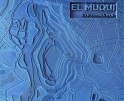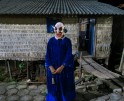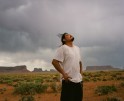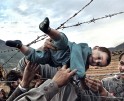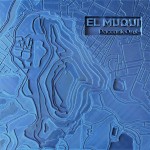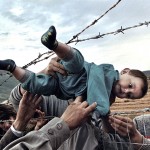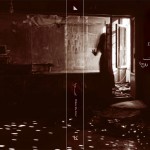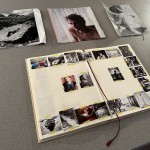Bárbara Traver: , te quiere, mamá
When asked to curate a week of posts leading up to Mother’s Day, I wanted to show artists whose work had not been shown before on Lenscratch. Because of my own endeavors and interest in family photographs, I chose artists whose work evolved from being a mother or a daughter.
I met Bárbara Traver as a fellow artist and participant at Revela’t 2022, a festival of contemporary analog photography in Villassar de Dalt, Barcelona, Spain. Her project “, te quiere, mamá” includes old photographs and mementos as well as new images. I found the series to be mysterious and poignant.
, te quiere, mamá
Within the responsibility as a mother, comes the inculcation of what they have learned, conditioning the woman she should have been. I soon realized that knowing her meant discovering myself, understanding motherhood as an act of sublimation that hides in the smallest details.–Bárbara Traver
Bárbara Traver (Spain, 1992) is a photographer based in London. Her work is about intimacy, identity, and the narrative or methaphorical potential with numerous artistic references and philosophical readings about the human being. For her, creation is in relation to daily and through the individual with her environment is like a mirage that reveals itself in a subtle and suggestive way.
She has exhibited her work in galleries and fairs such as CC Pati Llimona (Barelona), Galería Theredoom (Madrid) or Sala Marqués de Gonzalez Quiros (Gandía) and has participated in festivals and seminaris such as the Albarracin photojournalism festival, PhotoAlicante, Encuentros fotográficos Gijón, Fiebre, Utopia Markets or Cultur3 Club. In recent years, she have been awarded the EFTI gran (2018), the cultur3 Club Art Fair (2018), the VEGAP grant (2021) to continue working on her project , te quiere, mama, and most recently she has been a finalist in the photobook awards Athens Photo Festival (2022) and Fiebre Photobook (2022) with her photobook , te quiere, mama and won the second prize in the festival Revela-T (2022) with the same work.
Follow Bárbara Traver on Instagram: @barbaratraver_
DD: Can you please tell us a little bit about how you work with your mother to make the photographs?
BT: It was so strange at the beginning and we felt clumsy, especially me, so I decided to take it as a game, to let ourselves go, almost like a performance. I set up the camera ready and sometimes we were just taking pictures, sometimes we were just talking and then we were taking the pictures. There was nothing pre-meditated, it was just whatever came out. Then I would print them and show them to my mother and we discussed what we felt in them. Even when we were taking pictures, she would mention things that made me think. When taking the photograph, I have of me holding the eggs, I dropped one, and suddenly I saw my mother excitedly photographing the broken egg and she said: Look, this scene could perfectly be our relationship.
DD: Has your photography project changed your relationship with your mother in any way?
BT: My mother and I had a love-hate relationship, on the one hand she was my best friend and on the other she played the role of mother, which was tiring for me and you didn’t understand why you always came back to her and how she could take you into her arms. You think the relationship improves as you get older, but our maturity didn’t make those feelings relax, so I needed to start this work with her. As we explored the photographs and the many, many letters she wrote to me, as well as our conversations, I felt so much liberation because then I understood that my mother was going to love me whichever direction I chose, and on the other side she understood that it wasn’t that I didn’t need her–I will always need her–but that the direction she would have liked me to take doesn’t have to be hers. If our relationship changed? Actually, not but what changed was certainly our perception. I began to accept that I was becoming my mother and even better, I liked it, especially because I was beginning to understand her life and see her as a person. That meant that we could live together in the same room without throwing plates at each other’s heads and laugh without throwing things in each other’s faces. And I think she did too because I recently read in her diary in 2019: “Today I took photos with Barbara for her work. I’m in love with Barbara.”

©Bárbara Traver, Spain, mum’s letter, “Dear daughter, Today I wonder if I have been a good mother, maybe something was missing. I have thought a lot when in tears you begged me for an answer but unfortunately there is no such thing.”
DD: Can you tell us about the story behind the photo of the two chairs?
BT: Sure! I’ll start by saying that this photograph was the first one I took for the project without even knowing if it was going to be part of it. As I said, we were very clumsy about it. My father had just bought a house for my mother and himself and was reforming it, so my mother took me to see the house and, in that space, where there was nothing, there were only some curtains in place (which are the ones on the cover of my book) and those chairs which, as a curious fact, are more than 500 years old. A family heirloom that has ended up in my hands. The first thing I did when I entered the living room was to take out my camera and photograph the chairs, that instinct that we photographers have… And when my mother saw me, she asked me what I was shooting. Gosh I suddenly found myself between a rock and a hard place, because crying to my mother because I’d missed the train or my heart had been broken was very easy for me, but suddenly opening yourself up to her was very complicated, but look, you had to start somewhere… So, I told her that I was taking a portrait of us. My mother laughed with that comment and I thought: well, it wasn’t so bad… But suddenly there was a silence which lasted an eternity and suddenly she asked me who I was… I took a breath and told her that I felt like the chair that had been broken. Again, there was silence… And then she said: That’s funny, because that’s how I feel every time you leave me. That’s when I knew I had to keep that photograph. What’s more, I think that’s where it all started…
Deanna Dikeman has photographed her parents and relatives in Iowa and Nebraska for over 30 years. She was recently named a 2023 Guggenheim Fellow.
Instagram: @deannadikeman
Posts on Lenscratch may not be reproduced without the permission of the Lenscratch staff and the photographer.
Recommended
-
Paccarik Orue: El MuquiDecember 9th, 2025
-
Lauri Gaffin: Moving Still: A Cinematic Life Frame-by-FrameDecember 4th, 2025
-
Dani Tranchesi: Ordinary MiraclesNovember 30th, 2025
-
Art of Documentary Photography: Elliot RossOctober 30th, 2025
-
The Art of Documentary Photography: Carol GuzyOctober 29th, 2025












